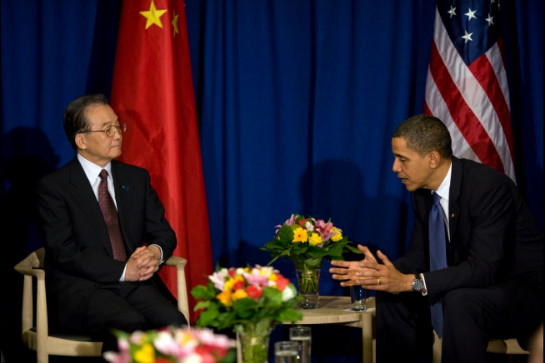 President Obama with Chinese Premier Wen Jiabao.
President Obama with Chinese Premier Wen Jiabao.
The U.S. Should Take the Lead on Climate Change
Climate change presents a serious risk to the national interests of the United States, yet it still struggles to garner political support to address it as a diplomatic issue. Expansive multilateral agreements such as the Kyoto Protocol have failed to produce any significant progress towards achieving objectives of reducing global emissions. This has been largely due to the need for balance between inclusiveness and commitments, necessitating that obligations be low enough that a large number of states are still able to participate. The most recent agreement from COP20 in Lima is considered to be a landmark for its high level of inclusivity and projected durability. However, it lacks any agreement on definitions, commitments, enforcement, or even financing, which means that it is still uncertain just how much good will come of it.
Since multilateral agreements must balance ambiguity and specificity to maintain participation of states, the U.S. should keep in mind that if it wishes to meet its objectives related to climate change then it must take the lead on it as an issue. Forging bilateral agreements, such as the recent accord with China, offers an opportunity for the U.S. to integrate climate issues with other foreign policy agreements. This allows the U.S. to elicit greater commitments from other nations when agreements that they have a vested interest in are contingent upon their cooperation on climate issues. This strategy of climate diplomacy allows the U.S. to overcome the traditional problems that have been associated with multilateral climate change agreements, namely the difficulty of getting free-riding states (such as China) to undertake commitments which they would otherwise deem as not worth the cost. We already see this strategy emerging somewhat with the president’s visit to India, where addressing climate change was a key part of the agenda despite India’s long opposition to setting emission targets.
The ability of the U.S. to integrate climate change into its bilateral relations with the world’s big emitters means that it is uniquely positioned to address climate issues through direct diplomacy. No other country in the world has both the motivation and capability to make headway on climate change in such a manner, and if the U.S. wishes to avoid a world where maintaining its interests becomes too costly due to the effects of climate change then it would do well to adopt a position of leadership on it as a global issue rather than treating it as a secondary concern.






[…] In his statement, Fallon also took the opportunity to emphasize the need for U.S. leadership in dealing with climate change, a position which ASP has discussed as well. […]